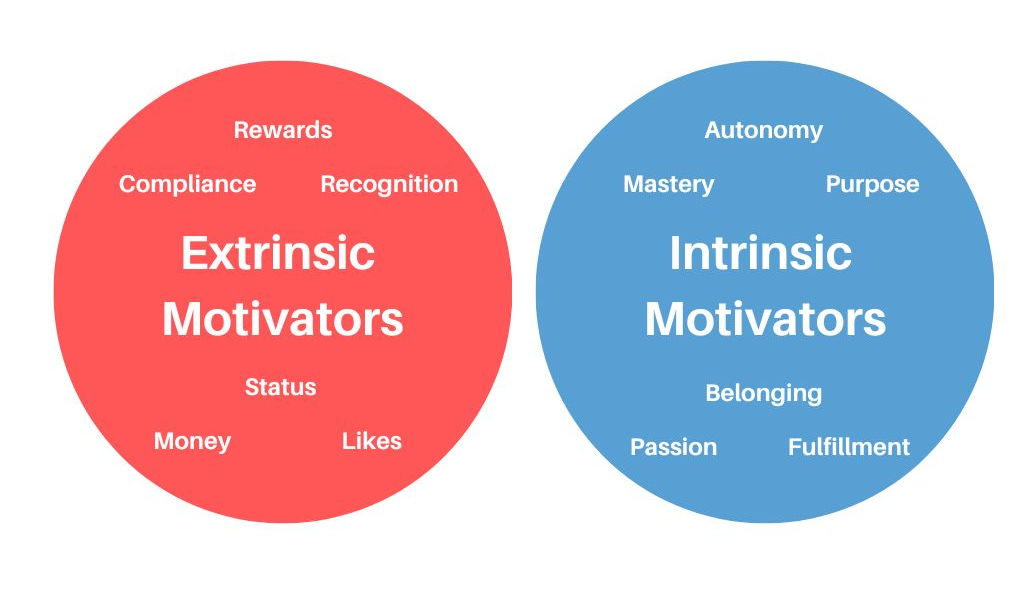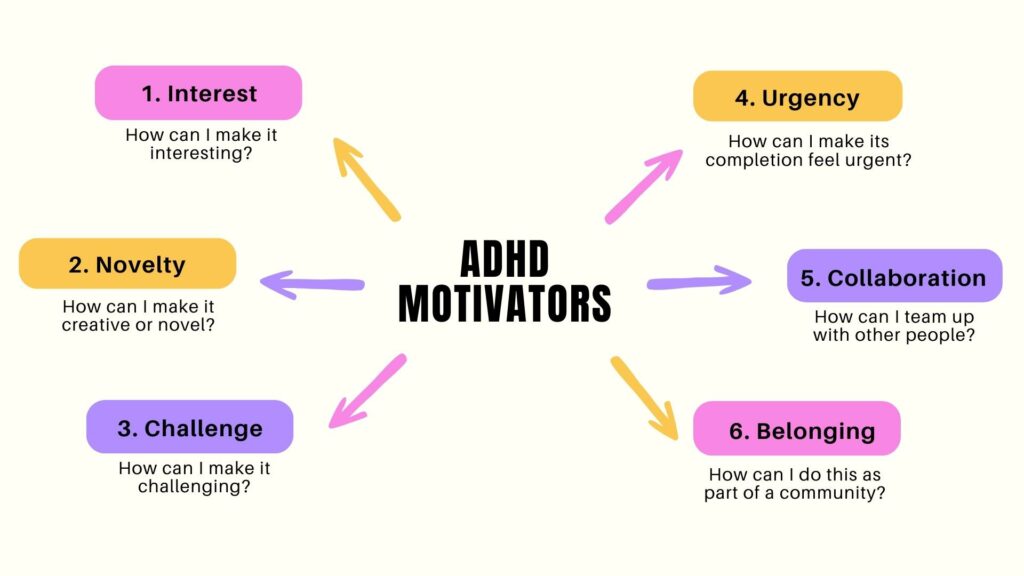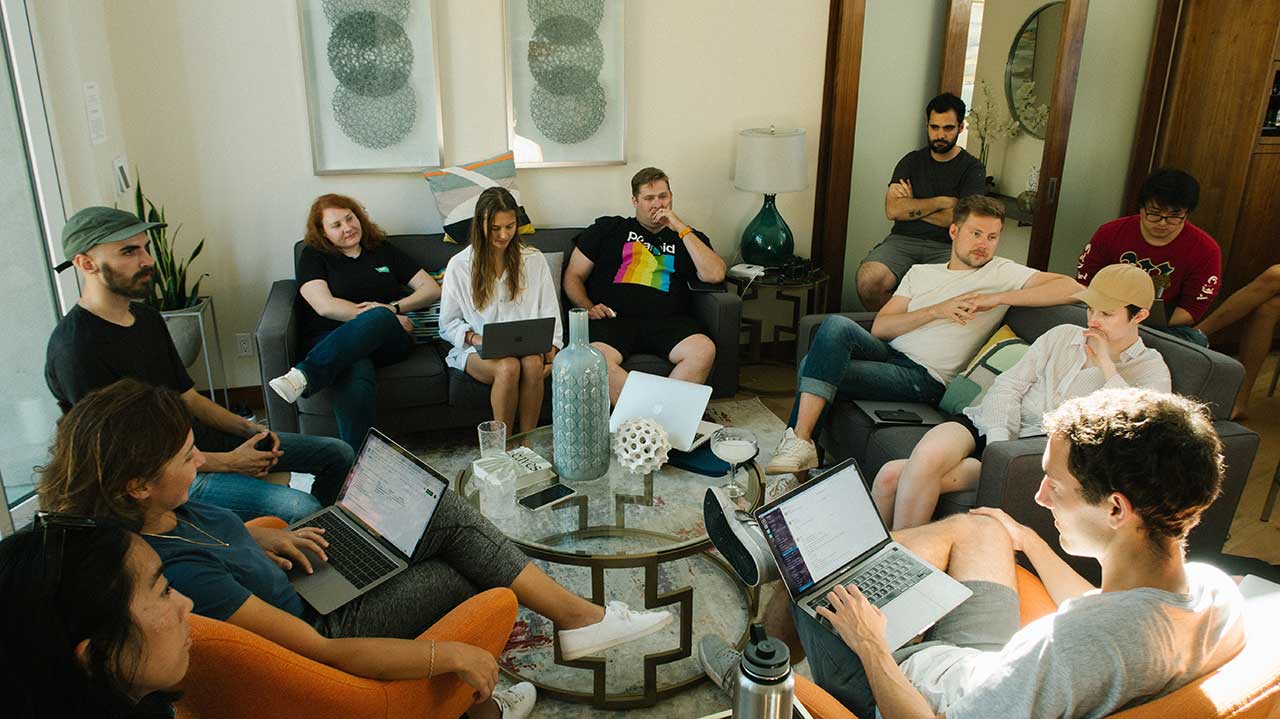One of my favourite profound quotes of all time is from American ethnobotanist and mystic philosopher Terence Mckenna:
“A secret is not something untold. It’s something which can’t be told.“
You will know it when you experience it yourself.
So, why am I writing a post about something that can’t be told?
Because it’s possible to point the way to a series of experiments that work like magic for entrepreneurial people with ADHD because they help light the inner fire of self-motivation and keep it burning brightly long enough to build a successful business.
Before I unveil these “secret” ADHD motivation triggers to overcome procrastination and task paralysis… it is important to understand how the ADHD brain is different from the neurotypical brain when it comes to motivation.
ADHD Motivation Vs Neurotypical Motivation

Most neurotypical people are motivated by 3 factors: importance, rewards and punishments.
When something is important they move it to the top of their to-list and they work their way down the list methodically.
As you know, this doesn’t work so work for someone with ADHD.
The problem with most traditional productivity advice and systems built around rewards and punishments that work well for the neurotypical brain is these strategies and systems don’t consistently engage and motivate the ADHD brain.
A good example is David Allen’s Getting Things Done (GTD) methodology, which makes perfect sense and often works great for neurotypical people but it doesn’t work so well for most people with ADHD.
To stimulate motivation in the ADHD brain, the rewards and punishments need to be immediate and the importance of a task or project needs to be connected to a higher purpose or mission to fully unlock the dopamine the ADHD brain craves.
Delayed rewards often don’t motivate us at all. While that long-term goal to build a 6-figure online business so you can buy your first house sounds great, procrastinating by checking the latest news, adding your opinion to Reddit or scrolling on Facebook provides an instant reward.
Perhaps the biggest challenge faced by ADHDers is task initiation, the act of getting started on a challenging task and moving thought to action.
I first learned about this in the excellent book on ADHD productivity called Extra Focus by Jesse J. Anderson.
He writes about the work of Dr. William Dodson, a board-certified psychiatrist who was one of the first practitioners to specialize in adults with ADHD.
Dr. Dodson is convinced that people with ADHD have an entirely different nervous system than neurotypical people.
He argues that most people have an importance-based nervous system while people with ADHD have an interest-based nervous system.
Those with ADHD aren’t as easily motivated by extrinsic motivators like rewards and punishments especially when they come in the form of significantly delayed gratification like an important work project due in a month — what engages their brain more is interest, novelty, challenge and urgency.
The more of these ADHD motivation triggers you can stack into your daily routine, the better you will be able to stayed focused and consistently motivated to pursue your long-term entrepreneurial goals.
The 4 Cs of ADHD Motivation For Overcoming Procrastination And Task Paralysis:
In Jessie J. Anderson’s book Extra Focus and on his Twitter, he frequently talks about the 4 Cs of ADHD motivation for overcoming procrastination and the difficultly with task initiation that’s common with ADHD known as task paralysis.
When I first read this excellent breakdown of ADHD motivators in his book, it struck me how similar the 4 Cs are to the flow triggers and the big 3 intrinsic motivators of autonomy, mastery and purpose that I’ve been teaching aspiring entrepreneurs for years.
Here are the 4 Cs of ADHD Motivation:
- Captivate (Interest): How can I make it interesting?
- Create (Novelty): How can I make it creative or novel?
- Compete (Challenge): How can I make it competitive or challenging?
- Complete (Urgency): How can I make its completion feel urgent?
Now that you’re reading about these 4 Cs the secret is out… but the reality is you won’t understand the power of these secrets until you start putting this knowledge into action and testing them out for yourself.
Then, it becomes wisdom and that’s what leads to transformation.
These motivational triggers are particularly important for ADHD entrepreneurs because it’s extremely difficult being your own boss (with or without ADHD…).
To be successful as a self-motivated entrepreneur and not lose our passion and motivation over time, you must develop a lot of insight and self-awareness into your unique ADHD tendencies and also have a deeper why that gives you a strong sense of mission and purpose.
Without this self-knowledge, the extrinsic motivators of rewards and punishments are much harder to put in place when you’re self-employed.
To make it easier to put these secrets into focused action and break the cycle of ADHD procrastination and task paralysis, Jessie puts the 4Cs neatly together into a helpful ADHD motivation formula:
To get started on [important task/project], I can use [captivate, create, compete, complete] to ignite my motivation and build momentum.
While your ADHD brain often struggles to initiate and stay focused on boring or tedious tasks, you can stack these motivation triggers to make it a lot easier to stay focused and waste less time procrastinating.
Adding 2 More Powerful Social Motivation Triggers:

So, that’s only 4Cs but I alluded to 6 motivational triggers in the title of this post.
From my own experience, I want to add at least 2 more ADHD motivation triggers that are particularly important for ADHD entrepreneurs:
- Collaborate (Group Flow): How can I team up with other likeminded people?
- Connect (Belonging): How can I join or create a community around this project?
One of the biggest problems with ADHD is the feeling of isolated and loneliness that comes from being surrounded by other people who don’t quite get you and your unique gifts.
That’s where collaboration and connection with other ADHD entrepreneurs and passionate creators comes in.
Being a part of a community of other entrepreneurial people with ADHD who are successfully using their gifts and talents to design their own lives and build the change they want to see in the world is a powerful self-motivator.
As the great motivational business speaker and author Jim Rohn says, you are the average of the 5 people you spend the most time with (make sure at least 1-2 of these people also have ADHD!).
Finding The Others
I’ve personally found this community among other outdoor enthusiasts and extreme sports junkies in the Canadian Rockies where I live near Banff, Alberta.
People with ADHD are attracted to risk-taking activities and adventure. There’s even some research that differences in oxygen in higher elevation mountain towns results in the release of more dopamine (and less serotonin interestingly) which attracts people with ADHD because they feel more alive living in the mountains.
I’ve also found this collaboration and connection with other entrepreneurs through online communities.
As someone who travels regularly to lead retreats and has lived in many different countries around the world as a digital nomad in the last decade, I’ve found it is helpful to have an accountability and emotional support community wherever I go.
That’s ultimately why I created the Flow Mastermind Group For ADHD Entrepreneurs.
Starting in the Startup Chile incubator in Santiago, Chile I was exposed to the joy of learning, socializing and collaborating entrepreneurs from 35 different countries.
During my 6 months in the Startup Chile community, I was struck by how many entrepreneurs either had ADHD like me or other challenging and paradoxical neurodivergent conditions like Dyslexia and Asperger’s Syndrome.
By some estimates people with ADHD are 500% more likely to become entrepreneurs than the rest of the population.
I saw first-hand how so many highly creative and easily distractible entrepreneurs with ADHD struggle with anxiety and trauma from having spent so much of their lives either trying or being coerced into fitting into the mould of neurotypical institutions.
Many of them got into entrepreneurship and applied to the Startup Chile accelerator precisely because they wanted to escape the neurotypical factory of traditional rote learning and passion-killing corporate jobs to live a different lifestyle based around their powerful motivational triggers like interest, novelty, challenge and urgency.
But the reality is that 80% of startups and new businesses fail… so entrepreneurs are probably going to have to fail at least 4-5 times before they strike the gold they are seeking.
Most people don’t make it because it’s a mental health rollercoaster and during the intense lows when the money runs out the security and comfort of a corporate job in the neurotypical world is very alluring.
That’s why having a community of likeminded ADHD entrepreneurs is so important to stick it out long term and get the emotional support you need to be resilient when pursuing very difficult challenges like building a successful business.
I want to end with another two of my favourite quotes, this time from neurodivergent and iconoclastic entrepreneur Elon Musk:
“Entrepreneurship is like eating glass and walking on hot coals at the same time.”
But…. “there are just times when something is important enough, and you believe in it enough, that you do it in spite of the fear.”




